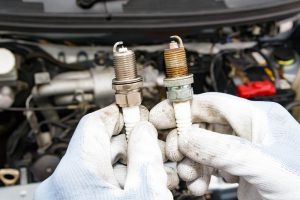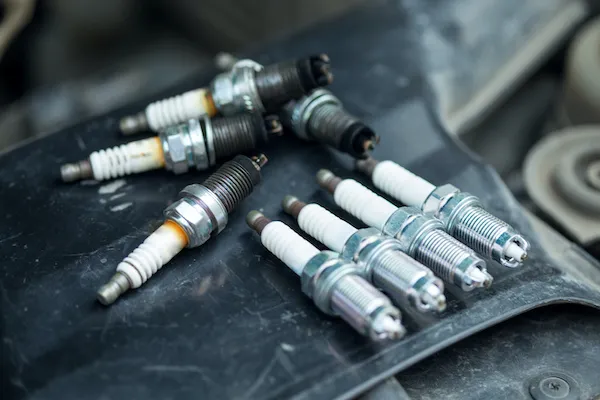What Spark Plugs Do
Spark plugs create a quick electrical arc that ignites the mixture of fuel and air inside the combustion chamber of your engine. This burst of energy forces the pistons to move. The crankshaft transforms that movement into rotating the wheels, which propels your vehicle forward.
Diesel engines do not contain spark plugs because they rely on greater compression ratios to create combustion.
Reasons for Bad Spark Plugs

The primary reason that spark plugs turn bad is because of time. The anti-corrosion coating that protects this component eventually wears out. Oil, carbon, and other dirt can now reach the plug and build up on it.
A bad fuel filter is another reason because this enables dirt, grime, and other contaminants to enter the fuel system. The grime eventually accumulates on your spark plugs and erodes the insulators, forcing electrical sparks throughout the engine instead of in the proper location. Misfiring and ineffective timing then affect your engine performance.
Signs of Worn Spark Plugs
When your spark plugs begin to wear out, it affects how your engine performs. The following are some of the signs.
- Rough idling. You hear strange noises such as knocking or rattling coming from your engine as you drive as well as feel unusual vibrations because your engine misfires.
- Slow acceleration. When your spark plug is too dirty to function optimally, it does not create the spark effectively, making your car feel sluggish. Your engine might stop, stall, and then sputter before it starts again. This can prove particularly dangerous if you’re on a highway where traffic is traveling at top speed.
- Hard starting. You might ordinarily think that the reason your vehicle has trouble starting is because of a faulty battery. This is particularly true if none of the electrical parts inside the cabin are working. However, if your spark plugs do not produce enough spark due to being worn out, your engine may also be difficult to start.
- Check Engine light is on. This light on your dashboards comes on for many reasons, including a loose fuel tank cover, a faulty oxygen sensor, or a serious engine problem. It also illuminates when your spark plugs are starting to fail. A steady light may mean a misfire, which can be addressed later. A blinking light may indicate a more serious problem that demands that you change the spark plugs immediately.
- Poor fuel economy. If you notice that you’re getting few miles to the gallon, faulty spark plugs may be forcing the engine to work hard, which leads to more gas being used up and more emissions being produced.
Where Can I Get My Spark Plugs Replaced near me?
If none of the previous issues are forcing you to replace your spark plugs, you can typically change them every 30,000 to 90,000 miles depending on the make and model of your car. Your owner’s manual reveals the schedule of your vehicle. For example, the Toyota Corolla requires its spark plugs replaced every 60,000 miles. The Toyota Sienna does not require a replacement until 120,000 miles.
Whether you can change the spark plugs yourself depends on how convenient they are to reach. With older vehicles, the job is relatively easy and needs only some wrenches and a new set of spark plugs. You can easily find instructions in your owner’s manual or online.
You may find the procedure impossible to do in more modern vehicles. With additional electronics, sensors, and computers, current engines have expanded to fill nearly every open space in their compartments. The spark plugs are generally difficult to reach because they’re blocked by other components.
Fortunately, we can do the job at Vtech Autonation. The automotive technicians at our Service Department are factory-certified and will use only the spark plugs recommended by the manufacturers. We specialize in the brand, so we can make the replacements quickly and efficiently, and typically as part of scheduled maintenance. You’re welcome to wait but if you need to get back to work, school, or home, you can take advantage of our free shuttle service.
https://www.toyotaofjackson.com/

